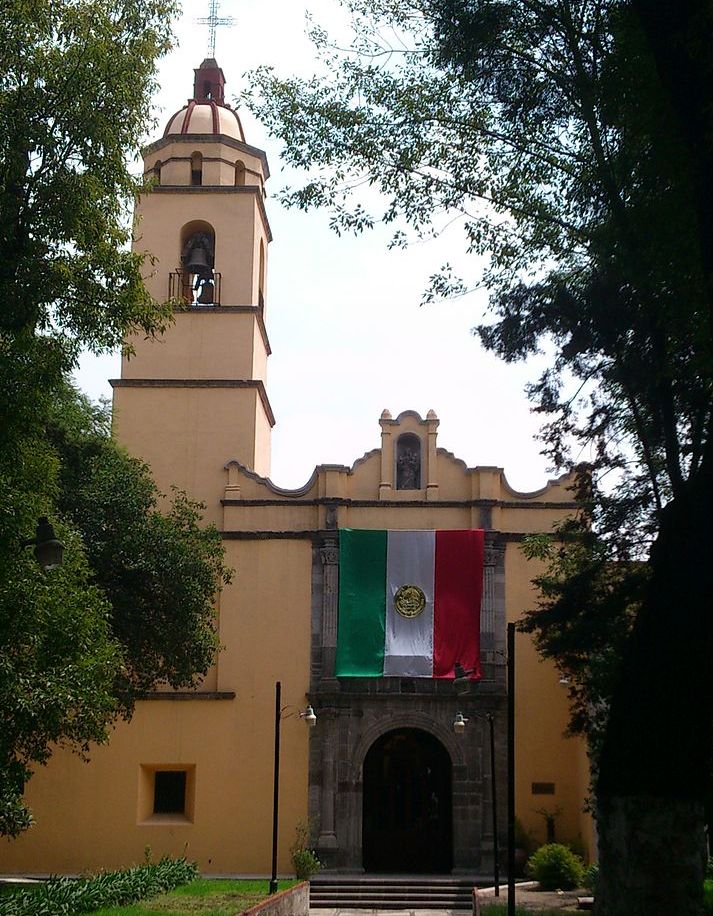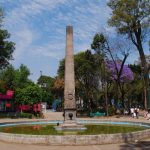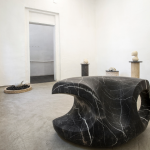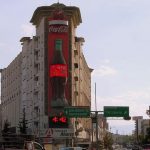
El Templo de Santo Domingo, y la Parroquia de la Purificación de Nuestra Señora de la Candelaria fueron alguna vez la iglesia y el monasterio más importantes de Tacubaya. Este es el único monasterio dominicano del siglo XVI que se conserva en la ciudad, y hoy, junto a la Alameda de Tacubaya, es conocido como un espacio verde en una de las zonas más concurridas de Tacubaya.
En sus muros está inscrita la fecha de 1590. De hecho, se cree que el lugar fue ocupado por los dominicos desde 1556. Los arcos llevan inscritos los nombres de algunos de las personas que construyeron la iglesia. Dedicada originalmente a Nuestra Señora de la Purificación, el día en que se conmemoraba su celebración era el de la Candelaria, y la iglesia sigue siendo más conocida como parroquia de la Candelaria.
De hecho, Tacubaya ya tenía importancia mucho antes de la llegada de los españoles. Sus fuentes de agua la convirtieron en un importante centro de comercio. Se cree que la iglesia actual, por antigua que sea, se construyó sobre un santuario dedicado a Cihuacóatl, una antigua diosa de las parteras.
La iglesia, que sigue siendo famosa por el atrio, inusual por los fresnos ya envejecidos, se abre en el lado sur con una entrada de peregrinos con tres arcos. La entrada principal, orientada hacia el oeste es una sencilla puerta de dos cuerpos. Estas fachadas son las únicas partes que quedan del edificio original del siglo XVI.
El interior perdió sus altares barrocos probablemente en el siglo XIX. Se conservan tres capillas laterales. El claustro adjunto de dos pisos albergaba las dependencias de los frailes dominicos. Los arcos de cantera, cuatro arcos de medio punto a cada lado en el primer nivel, y arcos de tipo carpanel en el segundo, están sostenidos por columnas toscanas. Éstas se encuentran con frecuencia en los conventos dominicanos y muestran muchos detalles originales así como tallas de gran calidad.
El altar mayor alberga un cuadro de la Virgen que llega al templo para purificarse cuarenta días después de dar a luz. También hay una escultura de madera del siglo XVIII que representa a la Virgen llevando al Niño Jesús en su brazo derecho.
En su interior está enterrada María Inés de Jáuregui, que presenció, junto a su hija Pilar de 13 años, la detención de su marido, el virrey José de Iturrigaray en 1808. Éste fue considerado traidor por su participación en el movimiento de 1808 durante el breve reinado de José Bonaparte de España.
El lado sur del atrio de la iglesia se llamó durante mucho tiempo Calle de las Ánimas. Hoy se llama Mártires de la Conquista. Según la leyenda, después de las ocho, casi todas las noches, un grupo de nubes poco iluminadas se elevaba y descendía sobre la calle. Estas cambiaban de color, forma y tamaño. Pero casi siempre adoptaban la forma de esqueletos humanos que emitían horribles gritos y alaridos. Esto casi siempre hacía reaccionar a los perros del vecindario. Y casi todos los habitantes de la calle se encerraban en sus casas. Los fantasmas podrían ser víctimas de la Inquisición que habían huido a los barrios de la colina de Tacubaya. Se dice que los dominicos realizaron exorcismos a lo largo de estos años. Algunos dicen que lavaron toda la calle con agua bendita.
 +525552734110
+525552734110
 https://www.facebook.com/pages/Parroquia%20De%20La%20Purificacion%20De%20Maria%20La%20Candelaria%20De%20Tacubaya/138015620277766/
https://www.facebook.com/pages/Parroquia%20De%20La%20Purificacion%20De%20Maria%20La%20Candelaria%20De%20Tacubaya/138015620277766/

Cercano a 0.08 kms.

Cercano a 0.34 kms.

Cercano a 0.35 kms.

Obras desafiantes y puertas abiertas...

Una de las fachadas más prominentes en el horizonte de la Ciudad de México, es tu primer paso hacia Tacubaya.

La respuesta de un barrio a la jungla urbana...

Jardín Republicano que data de mediados del siglo XIX y marca un lugar especial para Tacubaya en la historia de la ciudad.

Este enorme complejo comercial es la guinda del pastel de la Avenida Patriotismo.